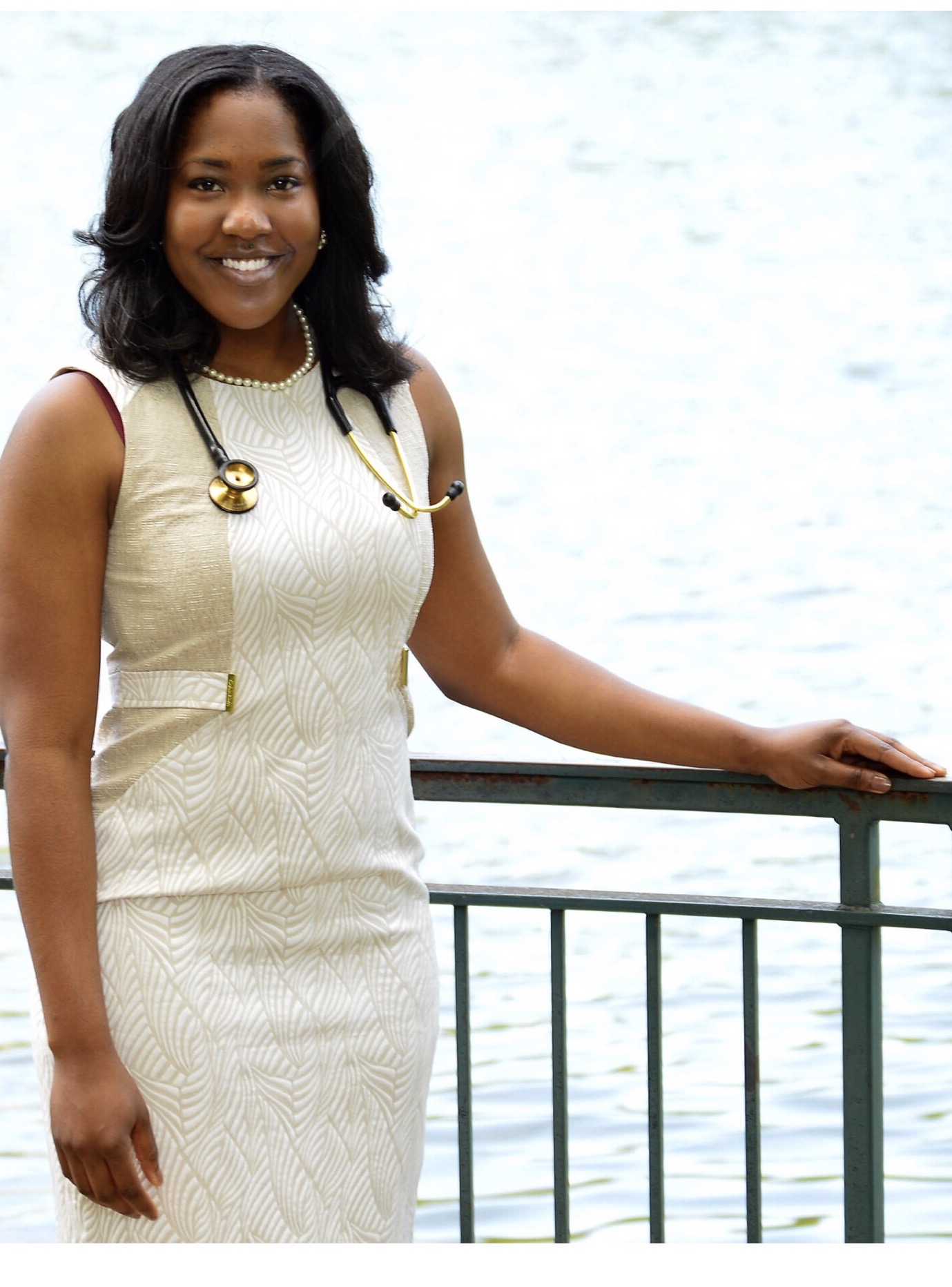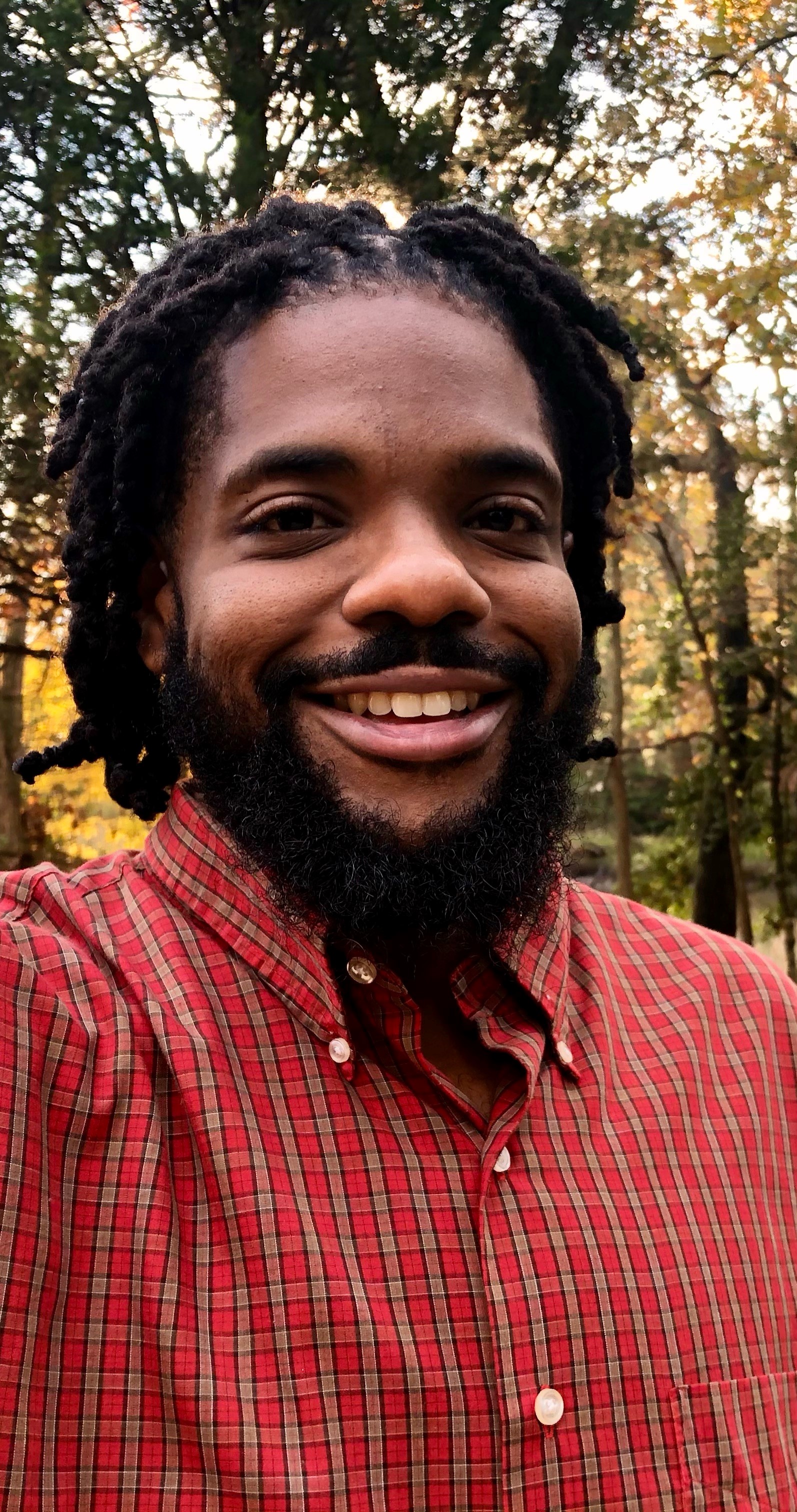Pediatrician Ashley N. Williams, M’17, finished her last months of residency at Emory University at the height of the social unrest that defined 2020. She watched the events unfold in her hometown of Atlanta, the birthplace of Martin Luther King Jr.
This story was published in the winter 2020-21 issue of 12th & Marshall. You can find the current and past issues online.
The city that has often found itself at the center of the country’s struggles with race and civil rights made national headlines with protests sparked by the deaths of Ahmaud Arbery and Rayshard Brooks, both of Georgia.
Even before the social justice movement took center stage, Williams had been asked to chair the pediatric residency program’s diversity committee at Emory. The role gave her an opportunity to foster open dialogue among her patients as well as her colleagues. “I make an effort to bring up social unrest,” she says.
Last summer, she organized conversations for residents and attending physicians to discuss racism and what it means to be an ally for people of color. National speakers delivered talks via Zoom about racism as an adverse childhood experience, and Williams saw her efforts lead to more pediatricians having intentional conversations with their young patients to learn about their experiences with racism and the protests.
“Racism affects our children in multiple ways and if we don’t discuss it, it has the potential to dramatically affect a child’s identity formation,” Williams says. “This not only includes Black children, but white children as well.”

Caring for patients from underserved backgrounds matters to pediatrician Ashley N. Williams, M’17, who participated in the International/Inner City/Rural Preceptorship program during medical school. “I felt it nothing short of a necessity that I, as a Black woman, give back to the community the best way I can and be an advocate for my patients and their health.”
Williams’ leadership comes as no surprise to Donna H. Jackson, Ed.D., assistant dean for admissions and director of student outreach in the VCU School of Medicine. She recruited Williams to participate in the VCU Division for Health Science Diversity’s inaugural Summer Academic Enrichment Program cohort in 2012. The intensive, six-week interprofessional program provides students with an academically rigorous experience that simulates the first year of dentistry, medicine, pharmacy or physical therapy professional instruction.
“What the students get from participating in the SAEP pipeline program is a sense of confidence that they can go to a health professions school and be successful,” Jackson says. “Along with that confidence comes being a leader — and if you’re a leader in one place, it’s just natural that it follows you.”
Jackson first met Williams on a 2011 recruitment trip at Hampton University, where Williams earned a master’s degree in medical science after graduating from Xavier University of Louisiana. Jackson was launching SAEP, a program she helped create to give potential applicants — especially those from backgrounds underrepresented in medicine — an opportunity to build relationships and a support system on the MCV Campus prior to medical school.
“Having allies and people to support me through my medical school journey was really helpful, and I built those relationships through the SAEP program,” says Williams, who also received financial support during medical school in the form of several partial scholarships. “I wasn’t shocked when I went into M1 year. I already knew some of the professors so it was easy for me to walk up to them and ask a question. There wasn’t an intimidation factor. I could even teach other students what I had seen before and help them, especially in anatomy lab.”
She went on to become the first SAEP graduate to earn her M.D. from the VCU School of Medicine. In August 2020, she joined a private pediatrics practice outside Atlanta and uses her experience as motivation for her patients.
“When I go into clinic and see a young Black girl or boy, I ask them what their plans are when they finish high school,” Williams says. “Seeing a Black physician gives them a physical representation of what they can accomplish in life. I make an effort to relay to my patients that I am just like them, and they, too, can accomplish their goals.”
Redoubling our efforts: A $1 million commitment

Sharing a racial or cultural background with one’s doctor has been said to promote communication and trust. Psychiatrist Xavier W. Belcher, M’11, says this connection is even more meaningful in an increased telehealth era. “Before you speak, it’s what a patient sees. And for some people, that can make or break what they’re comfortable sharing.”
Training physicians who reflect the diverse populations they serve is essential to the School of Medicine’s mission to improve the quality of health care for all. According to the Association of American Medical Colleges, increased physician diversity is often associated with greater access to care for patients with low incomes, racial and ethnic minorities, non-English speaking patients, and individuals with Medicaid.
The School of Medicine and the VCU Division of Health Sciences and Diversity offer a variety of pipeline programs to students from middle school through postbaccalaureate level. The programs are geared toward potential applicants whose backgrounds may limit their access to a career in medicine.
In addition to its pipeline programs, the medical school has a longstanding commitment to financial assistance for students who face barriers in access to a medical education. In recent years, more than $1.5 million in school-funded, need-based scholarships has been awarded each year to lessen the burden of debt students bear, including those who are underrepresented in medicine.
“We’ve been able to combine the preparation provided through our pipeline programs with financial support for some of those students who choose to come to the MCV Campus for their medical training,” says Dean of Medicine Peter F. Buckley, M.D. “Financial assistance has been the key to opening the door for those students who face difficult challenges as they work toward their dream of becoming physicians — it’s the other part of the equation.”
Now Buckley has committed an additional $1 million over four years to build a more diverse, inclusive and equitable community. Included in that is up to $600,000 to create a Dean’s Equity Scholarship that helps eliminate barriers to access for students of all backgrounds, cultures and socioeconomic status.
“Like communities across the nation, we’ve grappled with a global pandemic that has underscored health disparities and social inequities,” Buckley says. “Today, the importance of redoubling our efforts in this area could not be clearer. It’s immeasurably valuable to all our students — and to their future patients — to have a racially and culturally diverse student body.”
Housed at the MCV Foundation, the Dean’s Equity Scholarship will begin awarding scholarships next academic year, providing immediate relief for deserving students. Buckley invites alumni to join him – either by making gifts directly to the Dean’s Equity Scholarship, or by endowing a scholarship at the MCV Foundation.
Statistics show ...
In 2018, African Americans made up 13% of the U.S. population but only 4% of U.S. doctors and less than 7% of U.S. medical students.
The enrollment of Black students in medical schools has increased by only 1.2% over the last 40 years.
Between 1978 and 2014, the number of Black males entering medical school dropped from 1,410 to 1,337, even as the number of Black men earning college degrees rose.
A significant percentage of 2018-19 U.S. matriculants who identified as racial/ethnic minorities planned to practice medicine in underserved areas, including 60.5% of Black or African American matriculants, 48.8% of American Indian or Alaska Native matriculants, 41.9% of Hispanic, Latino, or of Spanish Origin matriculants, and 37.3% of Native Hawaiian or Other Pacific Islander.
When health care providers have life experience that more closely matches the experiences of their patients, patients tend to be more satisfied with their care and to adhere to medical advice. This effect has been seen in studies addressing racial, ethnic and sexual minority communities when the demographics of health care providers reflect those of underserved populations.
“There is no better way to learn about others than to engage with them,” says Donna H. Jackson, Ed.D., assistant dean for admissions and director of student outreach in the VCU School of Medicine. “A diverse medical school class provides a venue for this type of engagement for the benefit of all students and ultimately for the patients that our students will care for in the future.”
Source: Association of American Medical Colleges
“Gifts to a current fund like the Dean’s Equity Scholarship allow you to make a difference in the lives of today’s medical students,” says Brian Thomas, vice president and chief development officer at the MCV Foundation. “Because of its immediate nature, a current fund gift helps those who most need it, when they need it. The entire fund is put to use immediately. That’s different from an endowed fund, which is invested, grows over time and pays out a portion of the investment earnings each year, in perpetuity.”
Psychiatrist Xavier W. Belcher, M’11, remembers how fortunate he felt to receive scholarship assistance throughout medical school. The City of Richmond Huguenot High School graduate found his way to the MCV Campus via the School of Medicine’s Project ACEe, a pipeline program that provides local high school students with the chance to learn about different aspects of medicine through workshops and mentorship opportunities.
The self-proclaimed “science nerd” says Project ACEe introduced him to the possibility of a career in medicine. “I’d always been curious about discovery and liked the hands-on aspect of science. Project ACEe helped solidify health care as my interest. Prior to that, I didn’t have any personal experience with a career in health care. None of my family members are in the field.”
Applying to medical school without a health professional in the family can prove daunting. Potential applicants may not have the means to contact a physician for shadowing opportunities or they don’t realize the application process is 14 months compared to six months for undergraduate.
“When you don’t understand, you begin to wonder if it’s the right place or the right next thing,” Jackson says. “Then you factor in the mounting cost and now you have a deep debt load. Is it really worth it? We may be missing out on great physicians and great physician-scientists. But assistance from those who’ve gone before them can help make that road a little easier and the debt load a little lighter.”
‘If not for my Black mentors, I wouldn’t be where I am today’
Belcher credits the connections he made through Project ACEe with helping him find mentor Wally R. Smith, M.D., whom he shadowed while he was a student at the University of Richmond. Smith, who holds the Florence Neal Cooper Smith Professorship of Sickle Cell Disease, serves as the scientific director of the VCU Center on Health Disparities and director of the VCU Health Adult Sickle Cell Program.
“It helped open the door to what it’s like as a Black man being a doctor and identifying directly with Dr. Smith,” Belcher says. “It’s from my experience with him that I ended up where I am now.”
The sickle cell research Belcher conducted under Smith, a nationally recognized expert in the field, sparked an interest in pain management that led him to want to identify the cause of pain from a psychiatric perspective.
Like Belcher, Williams is the first physician in her family. However, growing up in Atlanta, she saw Black doctors and dentists who served as role models throughout her life. “They showed me what I could do. I wouldn’t have seen it as a possibility otherwise.”
On the MCV Campus, she found a mentor in pediatrician Stephanie N. Crewe, M.D., chair of the Division of Adolescent Medicine at Children’s Hospital of Richmond at VCU. Crewe grew up in Richmond’s inner city and returned to her hometown after medical training. As a student in the medical school’s International/Inner City/Rural Preceptorship program, Williams shadowed Crewe in community clinics serving the city’s most vulnerable populations.
“If not for my Black mentors, I wouldn’t be where I am today,” Williams says. “Having someone of color who has had similar experiences and can tell you what hurdles and mountains you might face speaks to the importance of increasing the number of underrepresented-in-medicine physicians. It gives you a feeling that you belong and you can accomplish something when you see someone who looks like you.”
Giving back to the community: Nothing short of a necessity

Xavier W. Belcher, M’11 (left), credits the School of Medicine’s Project ACEe pipeline program with putting him on the path to a career in medicine and connecting him with mentor Wally R. Smith, M.D. (not pictured). “It helped open the door to what it’s like as a Black man being a doctor and identifying directly with Dr. Smith. It’s from my experience with him that I ended up where I am now.” Photograph by Skip Rowland Photography
Research from the Journal of the American Medical Association found that physicians of color are more likely to treat minority patients and practice in underserved communities. Sharing a racial or cultural background with one’s doctor also has been said to promote communication and trust.
As a psychiatrist, Belcher sees this firsthand when he asks patients in rural South Carolina to share their most intimate and personal details — especially now when those conversations are happening over a computer screen.
“Before you speak, it’s what a patient sees. And for some people, that can make or break what they’re comfortable sharing,” he says. “Not having to deal with those initial barriers can be tremendously helpful.”
Both Belcher and Williams always planned to serve underrepresented populations.
“I felt it nothing short of a necessity that I, as a Black woman, give back to the community the best way I can and be an advocate for my patients and their health,” says Williams, whose current practice includes patients from lower socioeconomic backgrounds.
“People from certain communities tend to go back and help people in those communities,” Belcher says. “We are living in a world with disparities in how we deliver care. Investing in people who will target underserved communities will only improve the health outcomes we are all striving for.”
The medical school’s Jackson says pipeline programs help prepare students for such work. “We share with students the reasons those barriers exist, the responsibility to understand and advocate for those who lack access and the resources to help them assist their patients in overcoming those barriers. If, as a result, they choose to then work in communities that are most affected in that way, then that just becomes an additional benefit of what they have learned through the pipeline.”
Equity scholarships are another means to bring those benefits full circle — for aspiring physicians and their future patients.
“When you talk about more money for equity scholarships, you’re talking about changing some-one’s life,” Williams says. “But it goes beyond that because you’re also talking about the impact they’ll have on their patients’ lives. They can go back into the communities and do the best they can to bring about improved health access and outcomes.”
To learn more about the School of Medicine’s commitment to diversity, equity and inclusion, visit our DEI website.